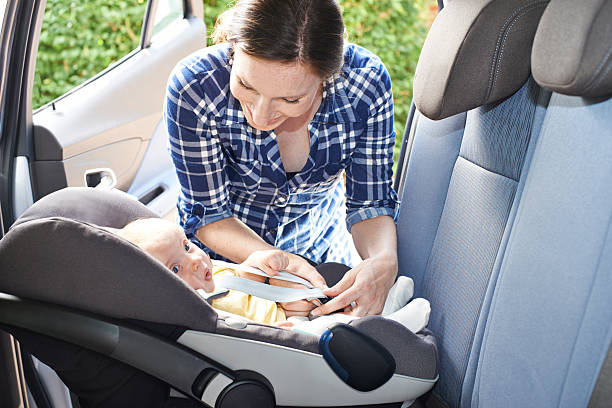
Eleven years ago, I recall reading through all the mom blogs, books, Pinterest, Google, Reddit – you name it- about what to do to prepare for the arrival of my new bundle of joy. The vast amount of information the internet offers can lead to conflicting information and more than one mental breakdown. Since September is Baby Safety month, I decided to compile information using the American Academy of Pediatrics’ Bright Futures (a.k.a. the Bible for pediatric clinicians) to highlight the most important topics for injury prevention in infants in the first year of life.
Car Safety
If you are delivering in a hospital, you will not be allowed to leave until you have a properly installed car seat in your vehicle. Local hospitals have car seat technicians to check your “custom” installation; however, you should be familiar with the process for when little Johnny is hanging out with grandma and you have to move the car seat to her car.
Your baby should be in a rear-facing car seat, with a harness, in the second row of your vehicle until he/she outgrows your car seat’s weight and height limit. Previously, the recommendation was until 2 years old, but this was recently revised to keep your baby safe. The best website to visit for all things car safety is the National Highway Traffic Safety Administration.
It is also worth noting that about 37 children on average die of heatstroke due to accidentally being left in the vehicle. Develop a routine and ALWAYS check the backseat.
Baby Blues & Depression
Let’s face it: whether it’s your first or your fifth, it is hard being a new mom! The tasks of keeping not only yourself and your household in functioning order but also a brand new human who depends on you for survival can be pretty daunting. It is completely normal to go through a period called “Baby Blues” which can show up within 2-3 days after birth and can last 2 weeks. The 80% of women who have had this, experience general sadness or moodiness, have trouble sleeping, eating, or making decisions, and feel like they cannot take good care of their baby.
If these symptoms last longer than 2 weeks, you feel like you don’t love your baby or your baby does not love you, or you feel like you may harm your child, you need to contact your healthcare provider because you may have Post-Partum Depression (PPD). There are ways to support you and your emotional health. Moms can develop PPD up to one year after giving birth.
Water Safety
To protect your baby from burns, the water heater temperature should be set at no higher than 120 degrees. Always check yourself with the inside of your wrist to make sure the water is not too hot.
Also, ALWAYS drain the bathtub, especially when your baby becomes mobile.
Sleep Hygiene
While room sharing is recommended up to 6 months of age, bed sharing is never recommended due to risks of suffocation. Your baby should be on his or her back, kept warm with a sleepsack or footed pajamas, and never asleep with a swaddle. Avoid putting a crib liner, wedge pillows, stuffed animals, and blankets in the crib with the baby. Crib slats should be no more than 2 3/8 inches apart, which became standard for manufacturers after 2011.
Environmental
To prevent falls, never leave your baby on a changing table, bed, couch, or any other surface which would put your baby at risk. This includes Bumbos on tables and counters!
Never leave your child unattended with your pets, regardless of whether or not they have interacted before. I have seen more than my fair share of bites in my time in the ER as a nurse.
Second-hand smoke exposure (e-cigarettes count too!) has been linked to higher rates of Sudden Unexpected Infant Death (SUID). If you are pregnant and struggling with smoking, there is a program in Kansas called KanQuit that can not only help you quit, but also provides diapers for meeting milestones. If anyone in your household is going to smoke, make sure it is done outside and that person wears a designated jacked that will be taken off before returning inside.
You should keep firearms locked and unloaded at all times in separate locations, especially once your child becomes mobile. I cannot imagine living with the guilt of a preventable accident.
This is by no means a comprehensive list, just the ones I personally feel are important to discuss. Remember that as your baby grows and changes, so do the safety risks they face. Pretty soon you will be worrying about a driving teenager!
Feel free to comment with anything you think I missed!
Make sure you never miss out on things to do in Wichita: subscribe to our weekly Wichita Moms Blog newsletter! Be the first to know about our exclusive events, special offers and discounts, neighborhood group activities and, of course, local resources and parenting voices powered by local Wichita moms!
















